PHILIPPINE MATERIALS IN INTERNATIONAL LAW, A COLLOQUIUM
Following the successful publication and launch of the book, the UP Institute of International Legal Studies (UP IILS), in partnership with the Philippine Society of International Law (PSIL) and the UP College of Law, held a virtual Colloquium on the book “Philippine Materials in International Law”, authored by International Criminal Court Judge (ret.) and former Dean of the UP College of Law, Judge Raul C. Pangalangan. The event was moderated by Atty. Paula Deveraturda, and featured members of the UP College of Law Faculty—Prof. Rommel Casis, Prof. Andre Palacios, Prof. Dante Gatmaytan, Dr. Jay Batongbacal and Prof. Michael Tiu, Jr.—who participated as a panel of experts, and presented their key insights and reflections on the selected book chapters.
Dean Edgardo Carlo Vistan, Dean of the UP College of Law, delivered the opening remarks, which was followed by a message from Prof. Elizabeth Aguiling-Pangalangan, President of the PSIL. Prof. Aguiling-Pangalan, herself a senior member of the UP College of Law Faculty, emphasized that with the PSIL’s overarching goal of promoting a broader understanding of the field of international law in the Philippines, the book “Philippine Materials in International Law” will be instrumental in providing perspectives that resonate with shared national experiences and in ensuring the development of international law that fits the context and reflects the vantage point of the Philippines.
Setting the stage up for an enriching discourse was a presentation from the esteemed author himself, Judge Pangalangan, who provided an overview of the book, with particular focus on the five key chapters subject of the Colloquium.
The panel discussions were pointedly nuanced and insightful.
Starting with the Chapter on “Sources of International Law”, Prof. Rommel Casis highlighted the novelty of the book as a whole, and particularly commended how the book makes the necessary distinction between the concept of domestication and the binding effect of international law, in general. Reflecting on its framework of analysis, Prof. Casis highlighted the book’s keen observation regarding the Incorporation Clause, the overuse of which leads to an erroneous application of law where “unratified treaties are made binding domestically qua international custom.”
Prof. Andre Palacios, who also discussed the chapter on Sources, focused on the book’s identification of the intersection of the two legal systems–domestic law and international law–which is important in order to identify the gaps in the domestication of international law. On this point, Prof. Palacios echoed Prof. Casis’ observation regarding executive agreements, or international agreements without need for Senate concurrence, as being detrimental to international law obligations.
Discussing the chapter on “Philippine Territory”, Dr. Jay Batongbacal commented on the legal and historical aspects of territorial studies, and noted how the book’s succinct compilation of relevant keystone documents will become an indispensable tool for lawyers and academics alike interested in the undertaking. In particular, Dr. Batongbacal zeroed in on the sharp inclusion of the “battle of note verbales”, or the exchange of diplomatic notes to the UN Commission on the Limits of the Continental Shelf (CLCS) in 2020, the relevance of which is often understated with regards the present national territory claims. Dr. Batongbacal, however, would argue to the contrary, stating that the notes themselves tend to cumulatively strengthen and reaffirm the positions that have already been taken by the international community regarding the South China Sea dispute.
The next panelist, Prof. Dante Gatmaytan, provided an illuminating discussion on the chapter of the book “Human Rights Cases under the Marcos Dictatorship”. Prof. Gatmaytan focused on the book’s discussion on the Judicial Record and the history-making duty of the Supreme Court. As these records are fact-based and decided by disinterested courts abroad, Prof. Gatmaytan underscored the need to make these decisions known to combat efforts of historical revisionism and denialism.
To cap off the discussions, Prof. Tiu presented his thoughts and insights on the chapter on International Criminal Law (ICL). Drawing on his expertise in the field, he discussed the role the chapter plays in reaffirming the Philippines’ commitment to the rule of law and our membership in the international community. Prof. Tiu expounded on the chapter’s effective use of history, particularly how, as an Asian, colonial, and third world country, the Philippines contributed uniquely to ICL development through doctrine and practice. Finally, he highlighted the chapter’s contribution to exposing the misreading of international law, as seen in the incorrectness of the Pimentel ruling on the distinction between signing and ratification, in light of how international law understands the two concepts, and in the Pangilinan ruling on mootness and actual case of controversy.
In the open form, Prof. Gatmaytan was asked how the legal community can combat the proliferation of ‘fake news’. Lauding the scholarship of Judge Pangalangan, he answered that members of the academe can follow in his footsteps by writing on doctrines that portray the evolution of law to make the truth known.
Another question which was posed by the audience was on the relevance of international law and its coercive effect on the rights of the Indigenous Peoples (IP). Prof. Batongbacal explained that the international community’s recognition of IP rights is significant to validate and reinforce the correctness of their claims. Adding to the discussion, Judge Pangalangan recalled that in Philippine history, it was the Philippine Supreme Court in Cariño which was unsympathetic towards the IPs in contradiction to the United States Supreme Court’s more forward-thinking view on the matter.
The last question was on the issue of executive agreements—whether there are available ways to approach and render clarity on the issue. Prof. Casis emphasized the need to have greater consistency concerning the criteria and definition of executive agreements. Relatedly, Prof. Palacios mentioned that the problem lies in the inconsistent application of the definition found in E.O. 459 because of the presence of executive agreements which have not undergone presidential ratification, contrary to the requirement under the executive order. Prof. Tiu further proposed that scholars could help clarify the concept through the pleading of these issues as they arise in cases before the Court. Finally, Dean Vistan explained that this matter is a reflection of a larger problem, that is, how to apply international law within the domestic system. To address this, he advises scholars in the international law community to provide a framework for the domestic treatment of international law.
A recording of the Colloquium is available on the UP College of Law’s Facebook page and YouTube channel.

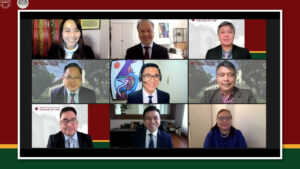
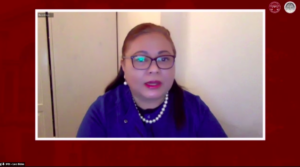
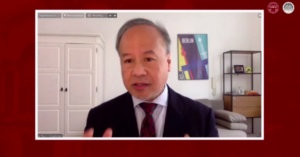
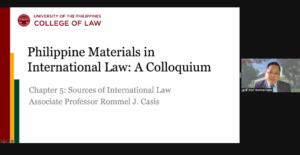
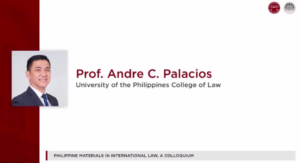
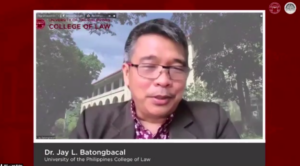
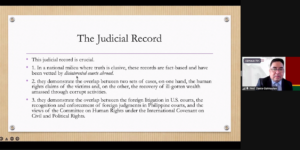
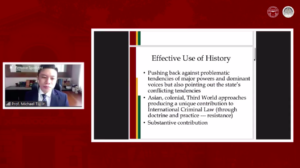
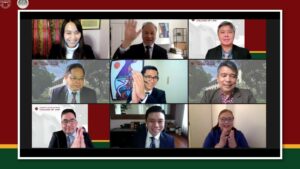






































































































 on the upper right corner to select a video.
on the upper right corner to select a video.